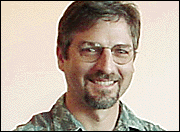Advertisement - Click to support our sponsors.


View Point
THE Star-Bulletin's March 25 editorial and letters to the editor have been highly critical of Dean Barry Raleigh's decision to cut the Marine Option Program (MOP) at the University of Hawaii. Finding a way to save
key programs at UHHowever, this decision was the inevitable result of a shrinking UH budget coupled with a university-wide policy that cut individual unit budgets ("death by a thousand cuts") rather than UH President Kenneth Mortimer deciding himself which programs to eliminate.
Less money means fewer services, regardless of who swings the axe. MOP is not considered central to the School of Ocean and Earth Science and Technology (SOEST), so it may be sacrificed in order that other SOEST programs can better survive.
Dean Raleigh has been painted the villain, and reasonable people can disagree with his priorities. But he has tough choices.
A "4-4-4 reallocation" program is repeatedly cutting SOEST's state funds and we are reaching the point where we can't afford to pay the people who work here.
We therefore need to focus on preserving the research programs that provide the bulk (about 80 percent) of our funding and which furthermore leverage considerable state funds. Other valuable but peripheral functions (and people) may have to go.
The 4-4-4-reallocation program, in a nutshell, works like this: Faced with shrinking state allocations, and reticent to make politically unpopular "vertical cuts" like the UH School of Public Health, President Mortimer's office has passed along budget reductions to each dean in the form of three 4 percent annual cuts, or nearly 12 percent in cuts.
Deans must make the hard choices of what to axe or save. Such a decentralized cost-cutting policy might work if each dean had one poor-quality program to kill, but could also result in good programs being sacrificed, especially if a dean has no bad ones.
Money saved through reallocation provides cash infusions to programs and services the president's office decides to save or improve. The 4-4-4 policy is a matter of robbing Peter to pay Paul.
Ironically, although deans get to "kill" programs, Bachman Hall gets to "save" them. Perhaps Bachman Hall should infuse reallocation cash into the MOP, if it is deemed worthy of survival.
TO a dean, the bottom line is saving key programs. SOEST's primary mandates are to carry out scientific research and to teach graduate and undergraduate-level courses to majors. We have been doing so by raising grant funds while struggling with a shrinking state budget.
However, those who think that scientific research is a goose that lays golden eggs should recall the children's story: You must care for the goose, not kill it.
If SOEST, or for that matter other units in UH, must support themselves on extramural funds rather than state funds, our missions must be focused on serving the master who pays the bills.
Eliminating MOP will bring an end to a popular outreach program, but will not eliminate students' access to marine science.
SOEST offers a degree program in Global and Environmental Studies (GES) that includes a curriculum rich in oceanography and marine studies for those who wish to become proficient in these fields.
The GES program ensures that those who teach, direct policy or work in scientific fields in our community receive a high level of training. In contrast, the MOP provides broad outreach with a curriculum weaker in science.
Perhaps such a program is needed in order to draw in a wider segment of the community, in which case it falls into the university's mandate of community service and should be considered in that context.
Effective advocacy ultimately depends on supporting the values, natural environment and institutions which contribute to the greater good of our community.
Perhaps, in this context, critics should be asking why our state university is so strapped for support that popular programs such as MOP and the School of Public Health must be sacrificed.
Khalil J. Spencer is an associate specialist in the University of Hawaii's Department of Geology and Geophysics, the School of Ocean and Earth Science and Technology, and a member of the board of directors of the University of Hawaii Assembly.
UH student newspaper:
Ka Leo O Hawaii